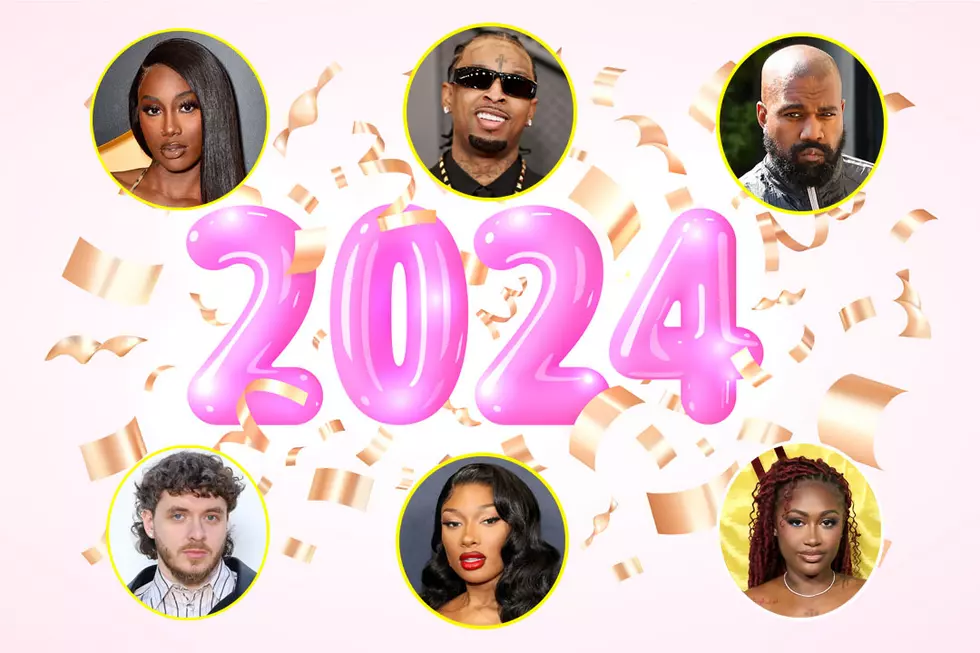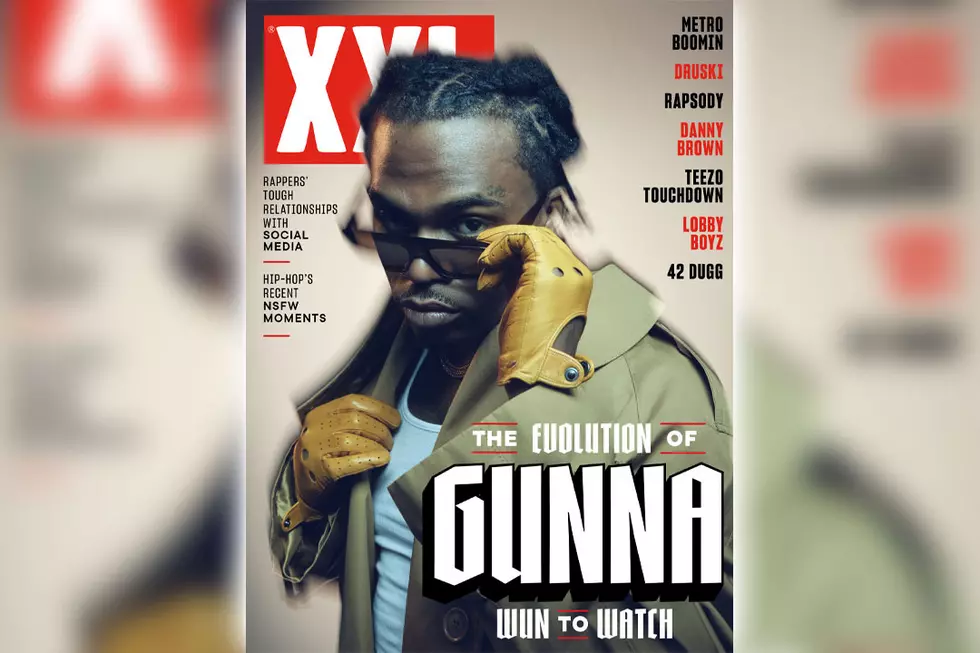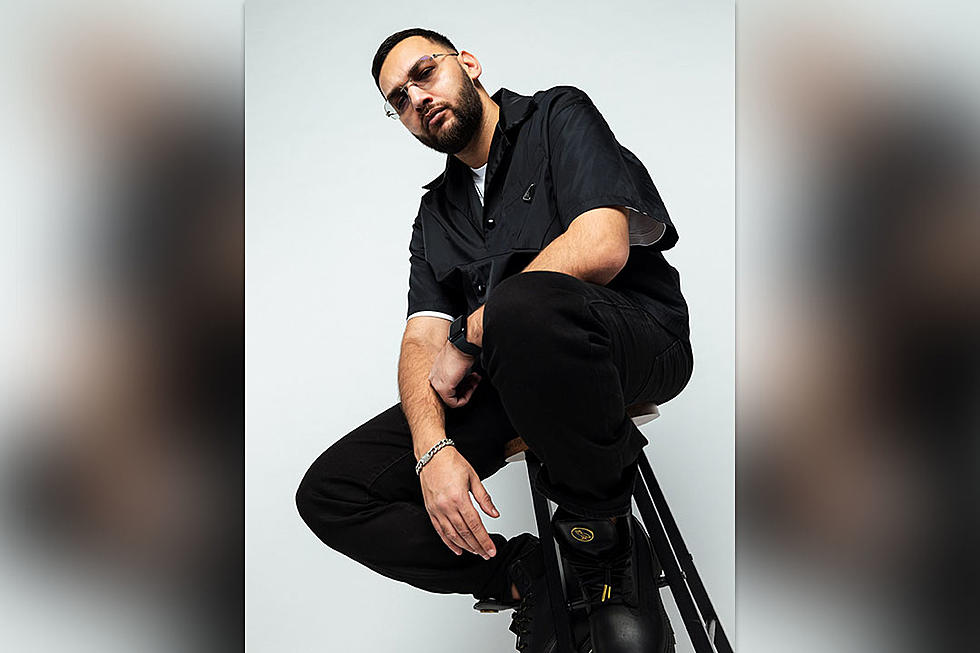
Kevin Liles’ Position Of Power – XXL Issue 149
Position Of Power
Kevin Liles is way more than an ex-label head and savvy businessman—he’s hip-hop’s biggest believer.
Words kris ex
Images Dustin Cohen
Editor’s Note: This story originally appeared in the July/August 2013 issue of XXL Magazine.
As Kevin Liles makes his way through the lobby lounge on the 35th floor of Columbus Circle’s Mandarin Oriental, New York hotel,
he has to politely inform every worker he comes across that he’s just taking a stroll to his old “office.” That office is a low corner table surrounded by plush chairs in one of the suites. Here, a wall of windows permits a panoramic scene of Central Park; the downtown view has a huge electronic CNN billboard, which displays the weather and the time.
After Liles left his position as executive vice president of Warner Music Group in 2009 (where he helped take the company from being privately held to going public), he spent every day holding court at this table. To him, the view of the most visited urban park in the country was a sign from God telling him that the world was his playground. Similarly, the CNN logo meant that he was to fulfill a mission to “create a new network.” Liles also liked knowing the time and the temperature.
“I’m a creature of habit,” he laughs while walking through the Mandarin. “If you ask me what I eat every day, it’s fish, chicken and vegetables. If you ask me where I particularly stay, it’s Four Seasons and Mandarins. In NY, I’m especially tied to the Mandarin just based off of the experience here. I almost moved here.”
He’s been patronizing the hotel since it opened in 2003. He estimates that he’s stayed in 60 percent of the rooms; he’s seen every room in the hotel, eaten at all three of its restaurants. And it’s where he wants to start his interview, because in many ways, that table is where the latest chapter of his life started. “If I’m here, they reserve it the whole day, and they treat me like it’s home,” he says while unbuttoning his tailored blazer and sitting down in his special suite with a view of everything Manhattan has to offer to the east.
He speaks about his various business ventures: Medxcom, a HIPPA-compliant smartphone app that allows doctors and patients full access to and control over their medical records while serving as a 24-hour answering service; KevDar, which provides high purity processing equipment for the pharmaceutical, food and dairy, and beverage and brewery industries; TrueComm, a telecommunications company that provides system integration and IT solutions to the private sector and government; and NextGenEDU, which supplies students with services that match their interests with educational paths and career opportunities—something he refers to as having an “owner’s manual” for your life. With his agency, KWL Management, he guides top-name rappers, R&B stars, producers, singer-songwriters, models and history-making sports figures—representing it as a small part of a portfolio based on a bullet-point philosophy that he’ll revisit countless times in conversation over the next few hours.
“The next phase of my life, there’s three things that anything I do have to be a part of it,” he informs. “Love and Leadership, Generation E—which stands for education, entrepreneurship, empowerment and employment—and then I want people to be passionate about the value proposition and what they do. Some companies I could never work for
if I’m not passionate about them. I vest heavily into those things and work hard every day, and all my businesses are personal to me. Every day when I wake up, I’m happy to look in a mirror and say, ‘I’m Kevin Liles, and I’m making a difference.’ And my life is based on those things that cause me to live—not cause me to go to work.”
If he sounds like a motivational speaker and a personal coach, it’s because he is. If not formally, then to his partners, his clients, his employees, everyone he meets. When he speaks about his accomplishments, he’s not bragging; he’s expounding on possibility. When he mentions his relationship with name-brand politicians and Fortune 500 CEOs, or that he has both a track and field and football stadium at his old high school and a street in his hometown named after him, it’s with I-can’t-believe-it awe and an acknowledgment that he’s not only beaten the odds, he’s a testament to an alternative. He speaks in grand, uplifting terms, always (always) bringing the topic back to his core values in personal, acute terms. “I would have never dreamed about these things, all the different businesses that I have,” he says. “It’s all about empowerment and providing a platform for everybody else. I could have never planned my life. How could I plan my life? The life that I’m living right now? I’m with the president in the White House in the Situation Room one day, with the president of Rwanda talking about education and empowering youth, and then I’m on the corner in Philly talking to a new artist, Asia Sparks. I could never write that down.”
Kevin Liles was born in Baltimore in 1968 to a teenage mother and a father he only began to make peace with after his funeral. (He reluctantly visited his biological dad on his deathbed and refused to be a pallbearer; when the casket slipped, he instinctively grabbed it to save it from falling and once again saw the hand of God in his life.) He grew up calling his grandmother mom and his grandfather dad “because they were there every day, and my parents were working every day.” He was a high school quarterback, but he began to pursue a rap career in his senior year. He attended Morgan State University on an electrical engineering scholarship from NASA, but he also DJed and, as part of an act called NuMarx, wrote and performed a song called “Girl You Know It’s True,” which became a hit when it was recorded by Milli Vanilli (or their ghost-singers) two years later. The song was a worldwide hit, but Liles and Numarx, not having their business correct, were not properly compensated or recognized. This led Liles to an unpaid internship at Def Jam Recordings in 1991. By 1999, he was the president and CEO of Def Jam Recordings and the executive vice president of Island Def Jam Music Group, creating unforeseen streams of revenue. While Def Jam founder Russell Simmons concentrated on expanding the brand with ancillary brands like the Phat Farm clothing line and the Def Poetry and Comedy Jam, Liles supervised the openings of Def Jam branches in California (Def Jam West), Atlanta (Def Jam South) and the United Kingdom, Germany, France and Japan, as well as Def Jam University. But his real accomplishments came with the ushering of what he refers to as his “Kevinism.”
“I had a different vision,” he admits. “I have an engineering background, so at the end of the day, I was always a techie. I was always interested in how we can use technology to broaden what we did and wasn’t afraid of trying different things and being quote-unquote a chief experimental officer, as long as we monetized what we did and people appreciated what we did.”
His chief experimentalism led to the creation of Def Jam Interactive, expanding the brand into mobile content and video games well ahead of the curve. During his years at the helm, the company’s bottom line doubled—which is a bragging right unmatched by any other urban music mogul. In a 2003 Crain’s interview where he was branded as one of the “40 Under 40,” he stated that he wanted to run a company “like Coca-Cola or American Express,” making it clear that he was playing on a different level.
“I never wanted to be head of Black Music of anything,” he clarifies. “I felt that I was an executive. You know what color I am—why are you gonna diminish my CEO-ism by saying I’m the president and CEO of a Black division? I had that luxury because Def Jam was just considered Def Jam. But I had the same human resources issues [major corporations] had, I had the same P&L [profit and loss] issues, I had the same innovation issues. So why not have the same respect?”
Kevin Liles is not a household name. He’s not an American Idol judge, he didn’t transfer a national sports franchise to his hometown, and he doesn’t show up in videos or self-promote relentlessly. “I’m not trying to sell a product,” he says offhandedly. “I’m not trying to sell anybody anything. I don’t just want to talk about what I’m doing. I want to talk about how, through my actions, we change the world. I’m doing this out of love for our culture. I’m not doing it for people to know what the fuck I’m doing,” he laughs.
He’s in Manhattan’s Flatiron District, making his way to the office space that’s becoming the headquarters for most of his business. MWW—the powerhouse independent PR firm he’s partnered with to form MWW Entertainment—is located on the eighth floor, and Liles was set up there temporarily, before taking over the ninth floor. The space is barely furnished. “Probably two months from now, this whole office will be full with people, things will be going on,” he informs.
He leads into an office, which serves as the headquarters of his media and beverage company, Go N’Syde. On the table are exotic tea blends like pistachio and cherry, plum blueberry, cinnamon apple and pineapple pomegranate clove. “It’s not a nutrition-oriented brand, but we don’t want to be contributing to the obesity of America here,” says Russell Hackmann, the company’s CFO. “The calories in it are about a third of what a Coke would have.” The price point will be about $2 per bottle, and they are working to get the drink in big box stores like Target and Walmart, as well as chains such as Walgreens. “There’s no minority-owned beverage company that’s distributed over 10,000 stores,” says Liles. “People might have pieces of different businesses, but there’s not a minority-owned beverage company that’s distributed to the masses.”
There’s also a 40/40 blend that they’re making for Jay-Z’s clubs as a cocktail mixer. They’re also exploring partnerships with various liquor companies for signature cocktails and looking to make lip balms and candles based on the blends. The trademark details for the company not only list it as “non-alcoholic tea beverages, namely, tea, iced teas, herbal teas and tea-based beverages with fruit flavoring” but also “audio, video and multimedia broadcasting via the Internet and other communications networks” along with a host of other electronic media more aligned with an app than a drink. The reasoning becomes clear as Liles explains the concept behind the beverage flavors. The blends are based around celebrities and icons—one inspired by The Trip To Bountiful— the Broadway play he’s produced that has been nominated for four Tony Awards, including one for Cicely Tyson for Best Performance By An Actress In A Leading Role—will be a cinnamon-spiced strawberry lemonade called Joy that can only be purchased during the play’s run; others will be based on the lives and locales and memories of their collaborators, say, Go N’Syde Passion by Trey Songz. But the real mind-bender is their focus on creating cutting-edge, smartphone-based, augmented reality games that interact with the drink. “When you go into our bottles, you’re actually gonna have The Trip To Bountiful come to life or maybe show a trailer or Trey Songz comes on top of the bottle and says, ‘Hey, welcome to Passion,’” says Liles. “The technology we have is crazy.” He cackles like a mad scientist, and if you’re inclined to think he’s off his rocker, you’d need to know that he predicted that mobile phones would become “the remote control to your life” at a keynote address over 10 years ago.
Kevin Liles is in his element. He’s grimacing and bobbing his head as he listens to the intro to an upcoming mixtape by his artist, 21-year-old Philly girl Asia Sparks. Sparks is a rapper’s rapper like the rap game hasn’t seen in years from a female. Her rhymes are fast, furious, pattern-breaking buckshot pellets, and Liles believes he’s hit the bullseye. “I got one,” he says gleefully. “No, listen when I tell you I got one. I done had Fox [Foxy Brown] already. I know what she is.”
The past three years have found Liles sitting atop a non-compete agreement as part of his departure from the Warner Music Group, which barred him from dealing with record publishing. In that time, he’s formed KWL Management, which is a holistic management company that represents slightly over two dozen artists, including Young Jeezy, Big Sean, Nelly, D’Angleo, Trey Songz and athletes like Olympic gold medalist Sanya Richards-Ross and Darrell Wallace Jr., the first African-American to reach pole position in NASCAR. Through KWL, he’s steered Young Jeezy into a position as a senior vice president of A&R at Atlantic Records and created Trey Songz’ Angels Network, a mobile app/social media network that generates $50K per month. It’s all an extension of the oft-vilified 360 deals he instituted with his friend and mentor Lyor Cohen while at Warner.
“The 360 mentality that we had is to add value,” Liles informs. “The 360 mentality that I think a lot of people have taken is they’re saying, ‘Well, if I help build you into a great artist, I should just get a piece.’ I don’t want a piece. I want to create value. I’m not a silent investor. I want to get in and show my worth, and every day I want them to wake up and say, ‘Hey, he adds value, so I want him to make a piece.’
“I believe that I’m not in the management business,” he continues. “I’m in the platform business. I’m not creating a new business; I’m trying to create a platform where people can plug into. See, what Roc-A-Fella plugged into was not another label—they plugged into a platform. What Irv and Murder Inc. plugged into was a platform. What Ludacris’ DTP [Disturbing Tha Peace] plugged into was a platform. What Ruff Ryders plugged into, it was a platform. So at KWL, I wanted to create a guidance and management platform. But every client that decides to partner with me, we have this value proposition conversation. Their value proposition to me is to continue the legacy of empowering the next generation. My value proposition to them is I’ve done it for 30 years. I believe I’m as powerful as a generator—plug into me, and I’ll power you up to do anything that you want to do. I’ve taken everything I’ve learned from engineering, everything I’ve learned from Def Jam, everything I’ve learned from Warner Music Group, going from intern to CEO to equity holder, and now I’m bringing it back, and I’m giving that power to partners saying, ‘Hey, I’ll tell you what: You’ve never had a guy that was the president and CEO of the most powerful rap label in the world, who took a company private and public, who came from engineering—you never had him next to you.’”
More From XXL









